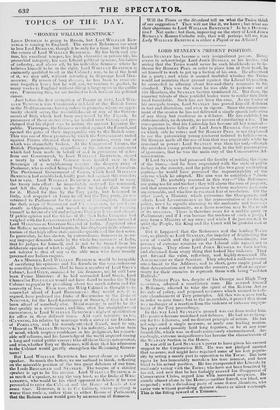LORD STANLEY'S PRESENT POSITION.
Loan STANLEY has hccome a very insignificant person. Being averse to acknowledge Lord JotiN Russm.h as his leather. end seeing that the Tories would never be such blockheads as to de- throne Sir ROBERT PEEL ill older to place him at their head, he set himself to work to get up a faction of his own. He advertised for a party ; and while it seemed doubtful whether the Toile:, would not maintain their ground againat the Liberal Oppoaition, he succeeded in alluring about five-and-thirty trimmers to his standard. This was the worst he was able to pelform : out of 638 Members, the STANLEY Section numbered 35. But then, the amazing talents of their youthful leader were to render this little band formidable. Such has not been the ease. As the leader of his renegade troops, Lord STANLEY has proved himself deficient in tact and discretion, and even in vigour. Since the commence- ment of the session he has not delivered a single speech indieative of any thing but readiness as a debater. Ile has exhibited no statesmanship, no dexterity, no pee ers of conciliating a foe. The consequence is, that his leadership has become all but nominal— Ids partisans have fallen off: Lord doliti RUSSELL does rot care oa which side he votes; and Sir ROBERT PEEL is But 111,pleaSed to s,co the patronizing young aristocrat reduced to helpheasness. Sir ROBERT made all the use of him that was practicable o bile he remained in power : Lord STANLEY was then his tooh—thuugh the mistaken young gentleman imagined, in the full presumption of ignorance, that he was the main stay of the Conatevative Ad- ministration.
If Lord STANLEY had possessed the faculty of reading the signs of the times,—had he been acquainted with the state of public feeling in the country, and the policy- of the two great coatending parties,—he would have perceived the impracticability of the scheme which he adopted. His aim was to establish a "Juste Milieu." He probably reasoned in this way—" The Reformers are going too far and too fast ; they will alarm the men of properiv, and that numerous class of persons to whom moderate lie ie.ures are agreeable, and who live iii constant fear of revolution. On the other hand, a Ministry which ratronizea the Orargemen, and selects Lind LONDONDERRY OS the representative or' its Ilweien
pulley, must equally alarming to the moderate and lime:ails ration of the community, as a fierce reaction may be the reault of its measures. There is therefore room for a middic party in Parliament; and if I can become the nucleus of such a party, I may form a Ministry of my own ; and while I do just entaiell to quiet the People, the King and the Court will be grateful end at case."
But it happened that the Reformers and the leadiee. Tories saw, as plainly as Lord STANLEY, the impolicy of frightering the men of wealth and the political alarmists. Accordingly, the persons of extreme opiniona on the Liberal side ago oil ent to press them. They chose Lord JOHN RUSSELL as their leader, and abstained from every •timing that looked like violence. They put forward the calm, reflecting and highly-connected Mr. A ;11.11Ca07.1BY as their Speaker. reflecting, adopted a milk-aid-water amrielment to the Address; aid in short, gave ample proof of their determination not to alarm the country, or Abler an oppor- tunity for their enemies to reproach them with being "red-hot Radicals."
Sir ROBERT PEEL too, despite of his Orange and high Tory aesoeiates, adopted a conciliatory tone. He ay owed himself a Refoimer, affected to take the spirit of time Rsferm Act as his rule of policy, and proposed measures which scented to math- cute abandonment of Tory principles. All this was a mete trick, in order to gain time; but in the meanwhile, it proved that there wea no danger of a reaction from the violence or extreme unropu- larity of the Tory proceedings. In this way Lord STaaiLEv's ground was cut from under him. hhi posit ien became undefined and dubious. Ile had DO rally mug- cry for his followers, and no distinct principle of action. He has not originated a single measure, or made one leading motion. No party could possibly bold long together, or be at any time formidable, which was so disad‘antageously circumstanced. Ae- coeliegly, extretne insignificance has become the eharacterietie of the Sea:II:Ey section in the House.
It was still in Lord STA N LEY'S power to have given his earnest support to the Corporation Bill. Ile was not pledged against that measure, and might have regained sortie of his lea pl n rity by acting a manly part in opposition to the Tor:es. But here again he has lamentably mistaken his true interest, and been blind to his actual position. He has exasperated the Liberals by uniformly voting with the Tories • who have not been benefited by his aid, and now that he has foolishly avowed his disapproval of Conservative Clubs, regard him with increased suspicion. Ile stands almost alone in the House,—neither feared, nor liked, nor respected; with a dwiudling party of some dozen Members, who never vote without provoking derisive cheers or silent contempt. This is the fitting reward of a Trimmer.


























 Previous page
Previous page